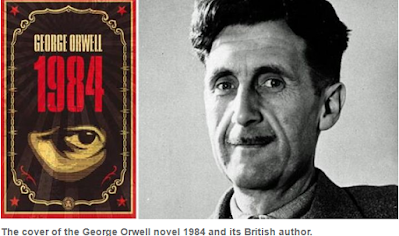"Comments by controversial White House adviser Kellyanne Conway have propelled George Orwell's classic novel, 1984, to become a top selling book on Amazon.
Sales of Orwell's dark drama set in a totalitarian state have soared since Conway, a top aide to US president Donald Trump, used the phrase "alternative facts" in an interview.
On Tuesday the novel was the sixth best-selling book on Amazon.
First published in 1949 and regarded as one of the 20th century's most influential novels 1984 describes life in a future authoritarian state called Oceania.
The novel focuses on the impact of state surveillance and the use of government propaganda to enforce loyalty to its dictator, known as 'Big Brother'."
'Fake news' named 2016 Word of the Year by Macquarie Dictionary
""Fake news" has beaten both "Halal Snack Pack" and "alt-right" to be given the 2016 Word of the Year honours by Macquarie Dictionary.
Each year the committee selects words from a range of categories, including fashion, business and sport, to compete for the title.
The editor of Macquarie Dictionary, Sue Butler, said "fake news" won in part because of its broad influence.
"Fake news" is a term that came to prominence in 2016, to refer to websites that deliberately published disinformation — often then promoted on social media for political purposes.
US President Donald Trump used the term a number of times while campaigning for the election, famously saying to a CNN news reporter during a press conference last year "you're fake news".
Ms Butler said the committee's job was to look for a word that had risen from the pack and had "some sort of broader context and meaning … as well as something a bit clever."
"But fake news, the shift from the notion that we can trust what we read in the papers is true, to we're never quite sure it's going to be true or not," she said.
"Because people are deliberately misleading us and it's considered fair, a clever strategy, something that everyone's doing."
""Fake news" has beaten both "Halal Snack Pack" and "alt-right" to be given the 2016 Word of the Year honours by Macquarie Dictionary.
Each year the committee selects words from a range of categories, including fashion, business and sport, to compete for the title.
The editor of Macquarie Dictionary, Sue Butler, said "fake news" won in part because of its broad influence.
"Fake news" is a term that came to prominence in 2016, to refer to websites that deliberately published disinformation — often then promoted on social media for political purposes.
US President Donald Trump used the term a number of times while campaigning for the election, famously saying to a CNN news reporter during a press conference last year "you're fake news".
Ms Butler said the committee's job was to look for a word that had risen from the pack and had "some sort of broader context and meaning … as well as something a bit clever."
"But fake news, the shift from the notion that we can trust what we read in the papers is true, to we're never quite sure it's going to be true or not," she said.
"Because people are deliberately misleading us and it's considered fair, a clever strategy, something that everyone's doing."
Yeah, right:-)



No comments:
Post a Comment